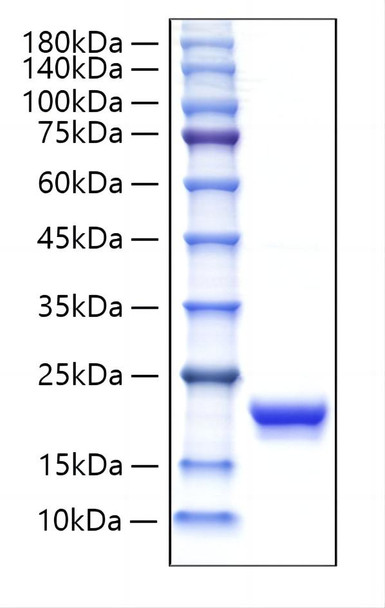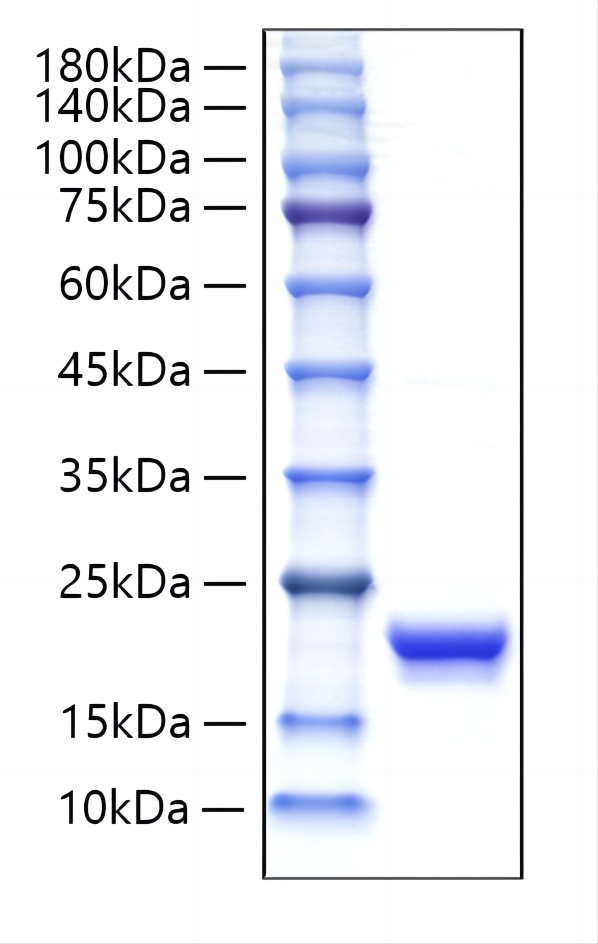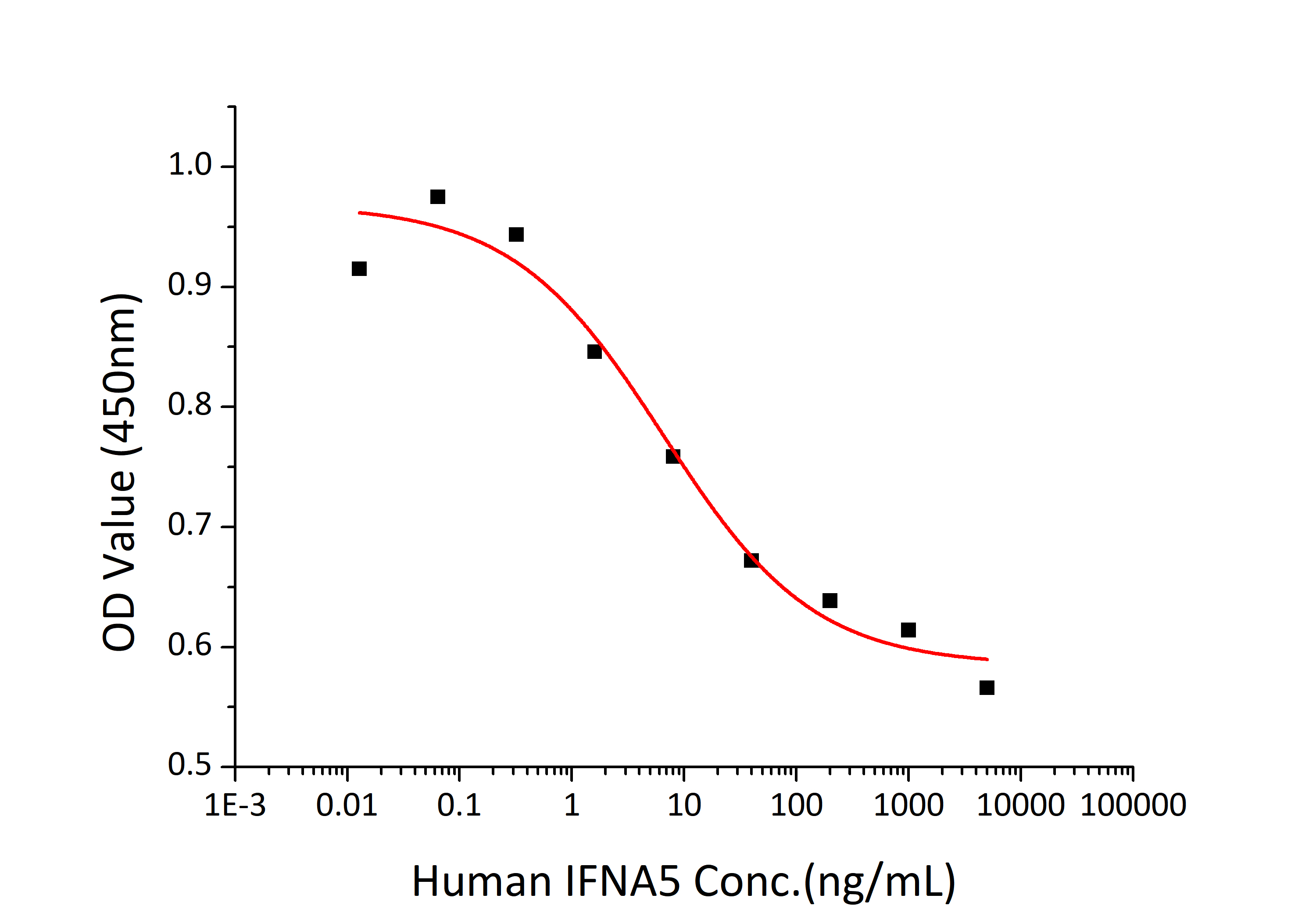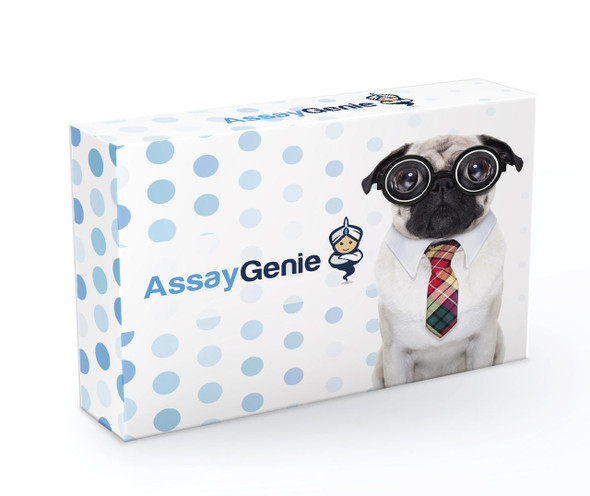Description
Recombinant Human IFN-alpha G/IFNA5 Protein
The Recombinant Human IFN-alpha G/IFNA5 Protein is a biologically active recombinant protein that plays a significant role in various cellular processes and signaling pathways in human biology. This protein is widely employed in immunological research, cell biology studies, protein-protein interaction analyses, and therapeutic development, providing researchers with a reliable tool for investigating IFN-alpha G/IFNA5 function and its implications in health and disease.
This product (SKU: RPCB1330) is produced using HEK293 cells and features a C-His tag for convenient detection and purification. The protein exhibits a calculated molecular weight of 20.53 kDa with an observed molecular weight of 20-25 kDa under denaturing conditions, achieving ≥ 90% as determined by SDS-PAGE.. Functional bioactivity has been validated through rigorous quality control assays, confirming its suitability for demanding research applications.
Key Features
| High Purity by Affinity Chromatography | |
| Mammalian & Bacterial Expression Systems | |
| High lot-to-lot consistency via strict QC |
| Product Name: | Recombinant Human IFN-alpha G/IFNA5 Protein |
| SKU: | RPCB1330 |
| Size: | 10 μg , 20 μg , 50 μg , 100 μg |
| Reactivity: | Human |
| Synonyms: | Ifa5, IFNA5, IFNalpha G, IFN-alpha G, IFN-alpha-5, IFN-alphaG, INFA5, interferon alpha-5, Interferon alpha-61, Interferon alpha-G, interferon, alpha 5, LeIF G |
| Tag: | C-His |
| Expression Host: | HEK293 cells |
| Calculated MW: | 20.53 kDa |
| Observed MW: | 20-25 kDa |
| Gene ID: | 3442 |
| Protein Description: | High quality, high purity and low endotoxin recombinant Recombinant Human IFN-alpha G/IFNA5 Protein (RPCB1330), tested reactivity in HEK293 cells and has been validated in SDS-PAGE.100% guaranteed. |
| Endotoxin: | < 0.1 EU/μg of the protein by LAL method. |
| Purity: | ≥ 90% as determined by SDS-PAGE. |
| Formulation: | Lyophilized from a 0.22 μm filtered solution of PBS, pH 7.4. |
| Bio-Activity: | Measured in a cell cytotoxicity assay using TF-1 cells. The ED 50 for this effect is 3.27‑13.06 ng/mL, corresponding to a specific activity of 7.66×10 4 ~3.06×10 5 units/mg. |
| Reconstitution: | Centrifuge the vial before opening. Reconstitute to a concentration of 0.1-0.5 mg/mL in sterile distilled water. Avoid vortex or vigorously pipetting the protein. For long term storage, it is recommended to add a carrier protein or stablizer (e.g. 0.1% BSA, 5% HSA, 10% FBS or 5% Trehalose), and aliquot the reconstituted protein solution to minimize free-thaw cycles. |
| Storage: | Store at -20℃.Store the lyophilized protein at -20℃ to -80 ℃ up to 1 year from the date of receipt. After reconstitution, the protein solution is stable at -20℃ for 3 months, at 2-8℃ for up to 1 week. |
Interferon, alpha 5 (IFNA5) belongs to the alpha/beta interferon family. IFNA5 is the only IFNA subtype detected in normal liver, while a mixture of subtypes is observed in the liver tissue of patients with chronic hepatitis C. Interferons are produced by macrophages, IFN-alpha has antiviral activities. Interferon stimulates the production of two enzymes: a protein kinase and an oligoadenylate synthetase. IFN-alpha, the first cytokine to be produced by recombinant DNA technology, has emerged as an important regulator of growth and differentiation, affecting cellular communication and signal transduction pathways as well as immunological control. Originally discovered as an antiviral substance, the efficacy of IFN-alpha in malignant, viral, immunological, angiogenic, inflammatory, and fibrotic diseases suggests a spectrum of interrelated pathophysiologies. IFN-alpha emerged as a prototypic tumor suppressor protein that represses the clinical tumorigenic phenotype in some malignancies capable of differentiation.








